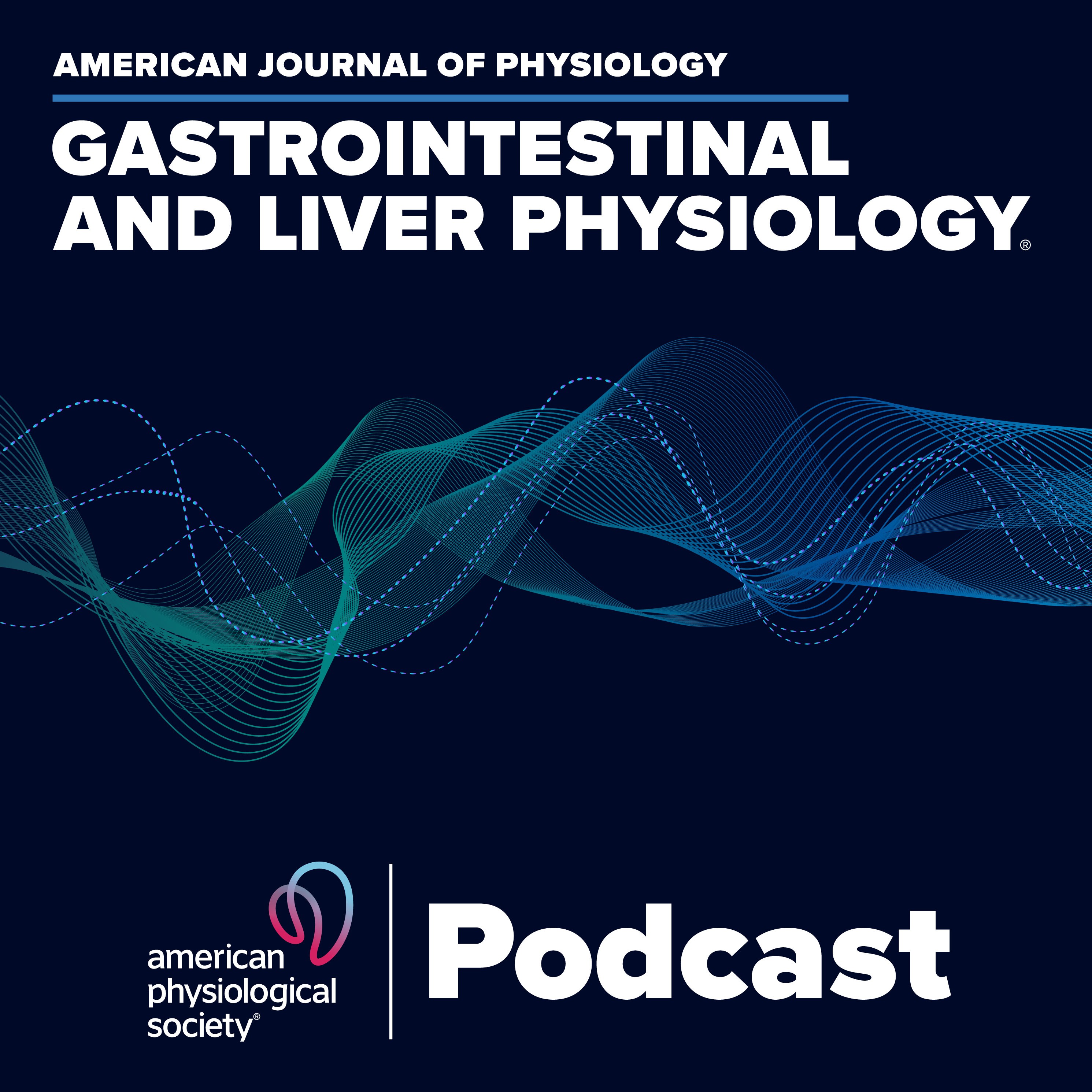
Episodes
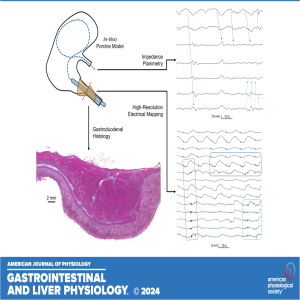
Friday Nov 01, 2024
Friday Nov 01, 2024
Join coauthors Sam Simmonds, Ashton Matthee, and Timothy R. Angeli-Gordon as they delve into their recently published research, "Electromechanical Coupling and Anatomy of the In Vivo Gastroduodenal Junction." In this episode, they explore cutting-edge techniques like electrical mapping, impedance planimetry, and histological analysis to investigate the complex dynamics of the gastroduodenal junction. Discover how contractions in the terminal antrum and pyloric sphincter correlate with gastric slow waves, while the duodenum experiences bursts of spike activity that trigger oscillating contractions. The team discusses their intriguing hypothesis regarding the relative scarcity of myenteric interstitial cells of Cajal in the pylorus, which may hinder coupling between antral and duodenal slow waves.
American Journal of Physiology-Gastrointestinal and Liver Physiology 2024 327:1, G93-G104
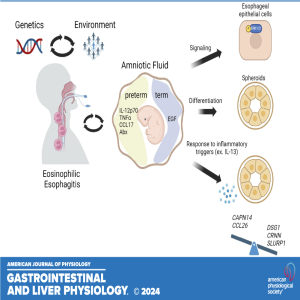
Tuesday Oct 15, 2024
Tuesday Oct 15, 2024
Join coauthors Mark Rochman and Marc E. Rothenberg as they explore their recently published paper, "Amniotic Fluid Modifies Esophageal Epithelium Differentiation and Inflammatory Responses." In this engaging episode, they discuss how the interaction between amniotic fluid and the esophageal epithelium during pregnancy impacts epithelial differentiation and influences the tissue's response to inflammatory stimuli, particularly interleukin 13 (IL-13). Discover the potential implications of these findings, including how they may predispose individuals to inflammatory conditions like eosinophilic esophagitis (EoE) later in life. This episode is a must-listen for anyone interested in developmental biology, immunology, and the long-term effects of prenatal exposures on health.
American Journal of Physiology-Gastrointestinal and Liver Physiology 2024 327:5, G629-G639
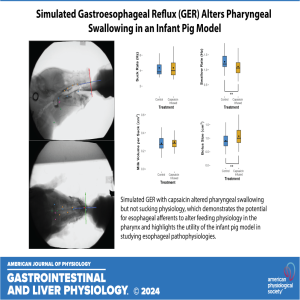
Monday Oct 14, 2024
Monday Oct 14, 2024
Join coauthor Chloe Edmonds in this insightful episode as she delves into her recently published paper, "The Effects of Simulated Gastroesophageal Reflux on Infant Pig Oropharyngeal Feeding Physiology." Chloe explores how simulating gastroesophageal reflux in an infant pig model reveals significant alterations in pharyngeal swallowing dynamics. Discover how the integration of esophageal afferents impacts motor outputs to the pharynx, leading to decreased swallow frequency and increased bolus sizes. This research not only sheds light on the mechanisms behind esophageal pathologies and oropharyngeal dysphagia but also highlights the potential for developing intervention strategies grounded in neurophysiology. Tune in for a deep dive into the implications of this work for both animal models and clinical practice!
Article Citation:
American Journal of Physiology-Gastrointestinal and Liver Physiology 2024 327:1, G105-G116
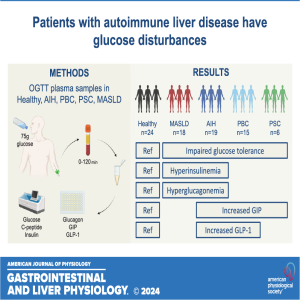
Friday Sep 27, 2024
Friday Sep 27, 2024
In this episode, coauthors Anne-Sofie H. Jensen and Nicolai J. Wewer Albrechtsen discuss the recently published research titled "Patients with autoimmune liver disease have glucose disturbances that mechanistically differ from steatotic liver disease." The authors reveal that patients with autoimmune liver disease, even in the absence of overt diabetes, experience early glucose disturbances.
Jensen and Albrechtsen highlight key pathophysiological traits specific to these patients, including altered incretin responses. This distinction is crucial because it suggests that the mechanisms underlying glucose metabolism issues in autoimmune liver disease differ significantly from those seen in steatotic liver disease. The authors findings could have important implications for diagnosing and managing glucose dysregulation in patients with autoimmune liver conditions.
Article Citation
American Journal of Physiology-Gastrointestinal and Liver Physiology 2024 326:6, G736-G746
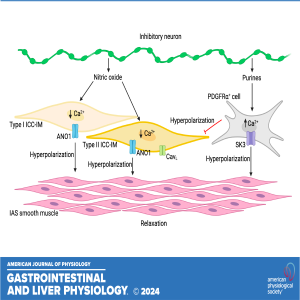
Friday Sep 06, 2024
Friday Sep 06, 2024
Coauthor Caroline A. Cobine dives into the fascinating world of internal anal sphincter biology in the latest episode of "Gut Guts." The research uncovers direct and indirect neural pathways that modulate intracellular calcium activity in interstitial cells of Cajal, shedding light on their role in smooth muscle cell function.
Article Citation:
American Journal of Physiology-Gastrointestinal and Liver Physiology 2024 327:3, G382-G404
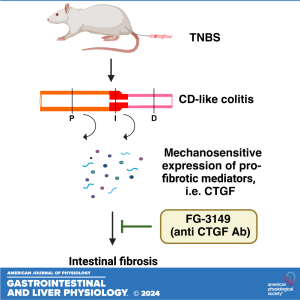
Friday Aug 23, 2024
Friday Aug 23, 2024
In this episode of "Gut Guts" coauthor Xuan-Zheng Shi discusses new research on intestinal fibrosis in Crohn’s-like colitis. The study found that mechanical stress causes a protein called CTGF to increase, leading to fibrosis. In a rat model, easing the mechanical stress reduced connective tissue growth factor (CTGF) and lessened fibrosis. This suggests that mechanical stress may be important in causing fibrosis in Crohn’s disease.
Article Citation:
American Journal of Physiology-Gastrointestinal and Liver Physiology 2024 327:2, G295-G305
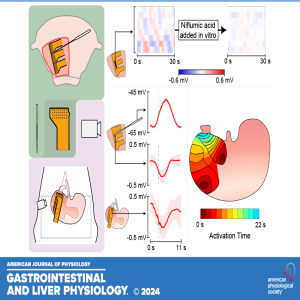
Wednesday Aug 14, 2024
"Got Guts" The Micro Version: Characterization of Rat Gastric Slow Wave Activity
Wednesday Aug 14, 2024
Wednesday Aug 14, 2024
Tune in to our latest podcast episode where Peng Du, Omkar N. Athavale, and Madeleine R. Di Natale dive into the fascinating world of gastric slow-wave conduction. They discuss their recent article titled "Mapping the rat gastric slow-wave conduction pathway: bridging in vitro and in vivo methods, revealing a loosely coupled region in the distal stomach" revealing regional variations in the organization of rat gastric slow waves. Don't miss this intriguing discussion bridging in vitro and in vivo methods!
Mapping of rat gastric slow waves showed regional variations in their organization. In some subjects, separate wavefronts propagated near the lesser and greater curvatures with a loosely coupled region near the midline, between the wavefronts, having a varying slow-wave origin. Furthermore, simultaneous intracellular and extracellular recordings were concordant and independent of movement artifacts, indicating that extracellular recordings can be interpreted in terms of their intracellular counterparts when intracellular recording is not possible.
Article Citation:
American Journal of Physiology-Gastrointestinal and Liver Physiology 2024 327:2, G254-G266
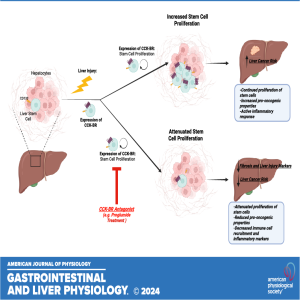
Friday Jun 21, 2024
Friday Jun 21, 2024
In this episode of "Got Guts" The Micro Version, Jill P. Smith highlights the recently published research titled "Implicating the cholecystokinin B receptor in liver stem cell oncogenesis." This investigation identified a novel pathway involving the activation of hepatic stem cells and liver oncogenesis. Receptor blockade or genetic disruption of the cholecystokinin-B receptor (CCK-BR) signaling pathway decreased the activation and proliferation of hepatic stem cells after liver injury without eliminating the regenerative capacity of healthy hepatocytes.
Article Citation:
American Journal of Physiology-Gastrointestinal and Liver Physiology 2024 326:3, G291-G309
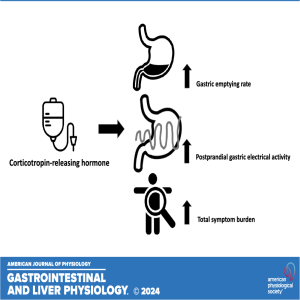
Friday Jun 07, 2024
Friday Jun 07, 2024
In this podcast, I-Hsuan Huang highlights the recently published paper titled "Effects of corticotropin-releasing hormone on gastric electrical activity and sensorimotor function in healthy volunteers: a double-blinded crossover study." The aim of this research was to investigate the effects of peripheral corticotropin-releasing hormone infusion on meal-related gastrointestinal symptoms, gastric electrical activity, and gastric sensorimotor function in healthy volunteers (HVs).
NEW & NOTEWORTHY In healthy volunteers, peripheral corticotropin-releasing hormone (CRH) infusion accelerates gastric-emptying rate and increases postprandial gastric response, accompanied by a rise in symptoms, but does not alter gastric sensitivity or meal-induced accommodation. These findings underscore a significant link between stress and dyspeptic symptoms, with CRH playing a pivotal role in mediating these effects.
Article Citation:
American Journal of Physiology-Gastrointestinal and Liver Physiology 2024 326:5, G622-G630
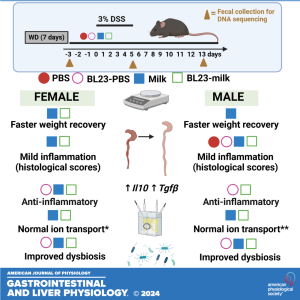
Friday May 24, 2024
Friday May 24, 2024
Coauthors Mélanie G. Gareau and Maria L. Marco delve into the findings of their latest research titled "Milk and Lacticaseibacillus paracasei BL23 effects on intestinal responses in a murine model of colitis." This study marked the first exploration into sex-dependent responses to probiotic Lacticaseibacillus paracasei and milk, as well as the potential of the dairy matrix to enhance probiotic protection against colitis. Surprisingly, female mice exhibited greater sensitivity to colonic injury compared to their male counterparts, and neither treatment effectively mitigated inflammation in both sexes. These sex-specific reactions may be attributed to variances in the baseline proportions of Akkermansia in the gut microbiome of female mice, shedding light on the intricate interplay between sex, diet, probiotics, and colitis outcomes.
Article Citation:
American Journal of Physiology-Gastrointestinal and Liver Physiology 2024 326:6, G659-G675
